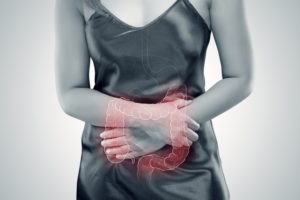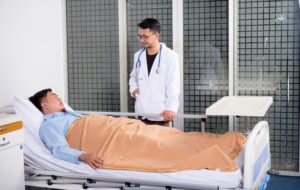Last week we discussed that antibiotics cause issues such as pseudomembranous colitis. We left off on a frightening note listing complications and risks of avoiding treatment. This week we will discuss treatments to avoid complications such as kidney failure, toxic megacolon, or dehydration.
Complications:
Complications of pseudomembranous colitis include abnormally low levels of potassium called hypokalemia, dehydration leading to low blood pressure, and kidney failure due to severe hydration resulting from diarrhea.
Some people get a perforated colon, a hole in the bowel, which can lead to infection in the abdominal cavity. Toxic megacolon is also a possible complication. This is a rare and serious swelling of the colon causing horrible damage or death. Toxic megacolon makes the colon incapable of expelling gas and stool. Without medical attention, the colon can rupture.
Diagnosis:
There are multiples types of different stool sample tests to detect C. difficile infection in the colon. Your doctor can use different tests to detect C. difficile and search for complications arising or already present. Your doctor may order blood tests. The blood tests may reveal high white blood cell count which is referred to as leukocytosis. This may indicate pseudomembranous colitis possibly caused by antibiotics.
If you share with your doctor that you are experiencing severe abdominal pains, doctors tend to order imaging tests. The doctors can check for any other possible sources of pain. The doctors may also run a CT scan to look for complications mentioned before. They will be able to see toxic megacolon or a colon rupture with this specific imaging.
Treatment:
To ease signs or even resolve your condition, your doctor may try stopping the antibiotic or other medications you are on that have been causing any signs or symptoms. Although you may be taken off one type of antibiotic, your doctor may put you one another that is more likely to be effective against C. difficile.
 The change in antibiotic allows normal bacteria to grow back which restores a much more healthy balance in your colon. There are multiple ways to receive the new antibiotic given. You may have an antibiotic you can take by mouth, through a vein, or through a tube which goes through the nose down into your stomach. This is called a nasogastric tube. Although it depends on your specific symptoms and condition, doctors will most often use metronidazole, vancomycin, fidaxomicin, or a combination of any previously listed.
The change in antibiotic allows normal bacteria to grow back which restores a much more healthy balance in your colon. There are multiple ways to receive the new antibiotic given. You may have an antibiotic you can take by mouth, through a vein, or through a tube which goes through the nose down into your stomach. This is called a nasogastric tube. Although it depends on your specific symptoms and condition, doctors will most often use metronidazole, vancomycin, fidaxomicin, or a combination of any previously listed.
If you condition is far more severe, you may be given a transplant of stool from a healthy donor. This restores the balance of bacteria in your colon. Your doctor may also opt for a combination of antibiotic treatment followed by FMT, fecal microbial transplant.
After receiving treatment for pseudomembranous colitis, symptoms should begin to be received within a few days. Researchers are working towards a vaccine for pseudomembranous colitis. We shall see what the future holds.
Treatment for reoccurring pseudomembranous colitis:
For reoccurring cases of pseudomembranous colitis, it becomes increasingly difficult to treat. The strands of C. difficile begin to resist antibiotics. Every time you have a reoccurrence, you become more likely to have additional reoccurrence. This is a dangerous cycle.
 To stop the cycle from continuing, you may get a second or third round of antibiotics to treat resistant conditions. For worse cases, surgery may be needed for people with progressive organ failure. You may also need surgery if your colon ruptures. Additionally, if the lining of the abdominal wall is inflamed you may need surgery.
To stop the cycle from continuing, you may get a second or third round of antibiotics to treat resistant conditions. For worse cases, surgery may be needed for people with progressive organ failure. You may also need surgery if your colon ruptures. Additionally, if the lining of the abdominal wall is inflamed you may need surgery.
Surgery involves removal of part or the entire colon. In the medical field, it is referred to as a total or subtotal colectomy. A less invasive surgery involves laparoscopically creating a loop of colon and cleaning it. This usually has positive results.
Lifestyle:
There are some things you can do at home differently. Drink plenty of fluids and eat more often but smaller meals. Avoid beverages high in sugar or any alcohol. Caffeine can be harmful as well, so avoid tea, coffee, and sodas.
Choose soft and easy to digest foods to alleviate symptoms. If symptoms are alleviated, you can slowly try to add high-fiber foods such as nuts, beans, and vegetables back into your diet. Avoid spicy, fatty, or fried foods. These make your symptoms worse and can improve your condition before ever getting to the point of needing surgery or intense medical attention.
Gastroenterology Consultants of Central Florida hopes you can benefit from these tips and see improvement! Book an appointment today with our doctors for colitis or any other issue you may be fighting. We are here for you.
Staff Writer
